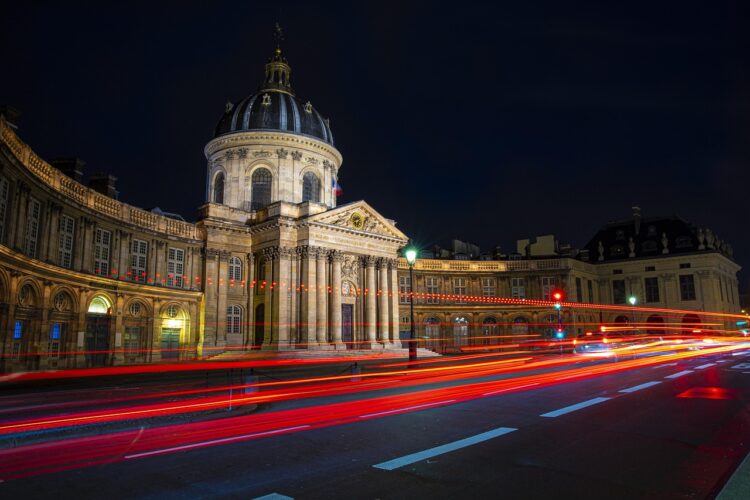Joanna Bowman : Une économie de guerre (Mars 2025)

Une économie de guerre
Le 5 mars, Emmanuel Macron a fait une adresse aux citoyens français. Dans son allocution d’une dizaine de minutes, dans son manière bien sérieux et nationaliste, il a déclaré ses projets de préparation pour une économie de guerre. Macron a insisté sur la nécessité d’une paix solide et durable en Ukraine, et a affirmé le soutien de la France dans cet effort. Il a annoncé une augmentation du budget militaire, qui atteindra 50 milliards d’euros cette année. Pourtant, il a assuré que ces nouveaux investissements ne nécessiteraient pas une hausse des impôts. Après 3 années de ce conflit, le chef d’État prend position contre la Russie, tout en condamnant le retrait de soutien à l’Ukraine de Trump. « Nous entrant dans une nouvelle ère » dit-il. Est-ce qu’il a raison?
Pendant la semaine, en anticipant cette adresse, le narratif répandu parmi mes collègues de travail était unanime : qu’on entre dans une époque effrayante, et qu’ils ont peur du monde dans lequel leurs enfants grandissent. Un pays qui se prépare pour une économie de guerre maintenant, pourrait facilement devenir un pays qui appelle sa jeunesse à l’armée. De plus, mes colocs ont beaucoup discuté de l’impact économique de cette initiative de Macron, surtout la hausse des impôts. Est-ce que ces inquiétudes sont valorisées ? On va entendre le 20 mars le plan de bataille du ministre de l’économie Eric Lombard, et on découvrira la réalité de comment le gouvernement va atteindre ces objectifs budgétaires.
Par ailleurs, la scène mondiale a récemment été dominée par les actualités interpersonnelles des chefs d’État, qui m’a fait beaucoup comparer le style de leadership de chacun. Prenons les stratégies de diffusion d’information sur les réseaux sociaux par exemple. D’un côté, on a Trump qui annonce des menaces contre le Hamas sur son réseau social à lui, en utilisant des majuscules et du langage typique d’un tweet et pas d’une déclaration gouvernementale. D’autre côté, on a les publications sur Insta de Macron, avec tout le drame et la gravité d’un révolutionnaire. Je serais intéressé de faire une analyse sur le comportement sur les réseaux sociaux des figures politiques – son évolution, la variation des styles, et son impact sur le monde politique – mais ça c’est un autre sujet.
Pour conclure, j’ai remarqué en France ces derniers temps une forte parole contre les États Unis, ainsi qu’une peur véritable pour l’avenir. L’esprit européen s’éloigne tellement de celui des électeurs de Trump, et c’est évident qu’on craint ce qu’on comprend pas. Dans les journaux et pendant les pauses café au travail, j’ai l’impression que l’homme dangereux n’est plus Poutine, c’est Trump. Je trouve très intéressant d’être en France pendant ces événements politiques. Même si les discussions se penchent sur des sujets dépressifs, je me focus sur le côté intéressant d’entendre les perspectives variées des autres. Cette année à l’étranger m’a sorti de ma bulle étudiante privilégiée, et rencontrer des gens d’âges, héritages, et vues politiques différentes que moi a été très intéressant.
A war economy
On the 5th of march, Emmanuel Macron addressed the citizens of France. In his speech of around 10 minutes, in his typical serious and nationalist manner, he declared his plans to prepare for a war economy. Macron made clear the need for a solid and durable peace in Ukraine, and confirmed France’s support in this effort. He announced a military budget increase, which will reach 50 billion this year. However he assured that these investments will not require an increase in taxes. After 3 years of this conflict, the head of state took a stand against Russia, while also condemning Trump’s withdrawal of support for Ukraine. “We are entering into a new era”, he said. Is he right?
During the week, in anticipation of his speech, the narrative amongst my work colleagues was unanimous : we’re entering into a frightening period, and they are scared of the world their kids are growing up in. A country that prepares for a war economy now, could easily become a country that calls its youth to the army. Also, my flatmates have been talking a lot about the economic impact of Macron’s initiatives, specifically a rise in taxes. Are these concerns well-founded? On the 20th of March we will hear the battle plan of Eric Lombard, the economic minister, and we’ll discover the reality as to whether the government will reach these budget objectives.
Moreover, the world stage has been dominated as of late by the personal interactions between world leaders, which has led me to make lots of comparisons between each one’s leadership style. Let’s take the strategies of sharing information on social media for example. On the one hand, we have Trump who announces threats towards Hamas on his own social media platform, whilst using all caps and language typical of a tweet and not a governmental declaration. On the other hand, we have the Instagram posts of Emmanuel Macron, with all the drama and seriousness of a revolutionary. I would be interested in doing an analysis of political figures’ behaviour on social media – its evolution, the variety of styles, and its impact on politics – but that’s for another time.
To conclude, I have noticed a strong discourse against the United States in France lately, as well as a real fear for the future. The European mindset is so far removed from that of Trump’s voters, and it’s obvious that we fear that which we do not understand. In the newspapers and during coffee breaks at work, I get the feeling that the dangerous man is no longer Putin, it’s Trump. I’ve been finding it really interesting to be in France during these political events. Even though the conversations are often about depressing subjects, I am focussing on the interesting aspect of hearing the varied perspectives of others. This year abroad has popped my privileged student bubble, and meeting people of different ages, heritages, and political views to mine has been really interesting.
